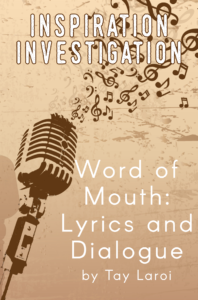 I don’t remember a single day of my life that wasn’t surrounded by human speech. If I wasn’t talking to family, I was talking to friends. If I wasn’t talking to friends, I was listening to teachers. If I wasn’t listening to teachers, I was listening to music or nearby chatter. If I wasn’t listening to music or chatter, well, you get the idea.
I don’t remember a single day of my life that wasn’t surrounded by human speech. If I wasn’t talking to family, I was talking to friends. If I wasn’t talking to friends, I was listening to teachers. If I wasn’t listening to teachers, I was listening to music or nearby chatter. If I wasn’t listening to music or chatter, well, you get the idea.
It’s like that for most people and yet, for some reason, writing dialogue as unique and natural as real speech is one of the hardest parts of writing fiction. It is for me, anyway. It’s something I’ve admired about lyricists for years. While lyrics usually mimic real speechless than dialogue due to the nature of poetry, they often capture personality, tone, emotion, and common speech in a way that written dialogue can sometimes struggle with. What’s even more baffling is that some lyricists can give voice to a multitude of people.
Like the ever phenomenal Vienna Teng.
I’m going to do my best to keep my gushing to a minimum, but no promises. I’ve fawned over this woman and her work ever since I saw her perform at my college six years ago and I don’t plan on stopping anytime soon. If I’m not admiring her incredible piano work, it’s her brilliant use of modern musical styles or, as it relates to this article, her lyrics.
Her two most recent albums, Inland Territory and Aims, show off her talent the strongest. One’s a somewhat traditional singer-songwriter collection while the other is more experimental, but they both tell diverse, vivid stories, sometimes side by side.
For example, “In Another Life” tells the story of two souls’ journey through multiple lifetimes. The narrative voice has relatively little personality, which works very well considering how diverse the souls’ lives have been. It makes more sense to have the voices be blank slates than emulating any one culture or time. The next track, “Grandmother Song”, does a complete one-eighty. It’s told from Vienna’s grandmother’s point of view in a soulful, southern twang full of colloquialisms and patterns similar to African-American English. Vienna pulls it off so well that my Dad, who is black, was genuinely surprised when he realized she wasn’t as well.
“In the 99,” sounds completely different from either song. While it’s impersonal like “In Another Life,” it’s choppy, urgent and swift as it takes quick snapshots of 21st century America and full of hypothetical questions that no one seems able to answer, either in the song or in real life. “Hymn of Acxiom” takes the strangest turn yet. It’s full of double-speak and false promises as social media is personified and lulls its users into a false sense of security and satisfaction. And those are only four songs from Vienna Teng’s repertoire.
Obviously, a lyricist and a fiction writer aren’t going to craft a person’s words the same way, but I think there’s a lot to learn from how musicians communicate through speech and the words they choose to do so. One could even look at larger categories of music and see the differences. A pop singer isn’t going to speak like a country singer and neither of them are likely to speak the same way as a Hip-Hop or R&B artist, even if they’re all talking about the same thing. Just look how universal love songs are, yet they don’t sound the same across genres.
So, next time you’re driving with the radio, take a moment and flip through the channels. Listen to what lyricists are saying and how they’re saying it (yes, even country lyricists). Maybe you’ll find a new way for your characters to say what they want to say.

